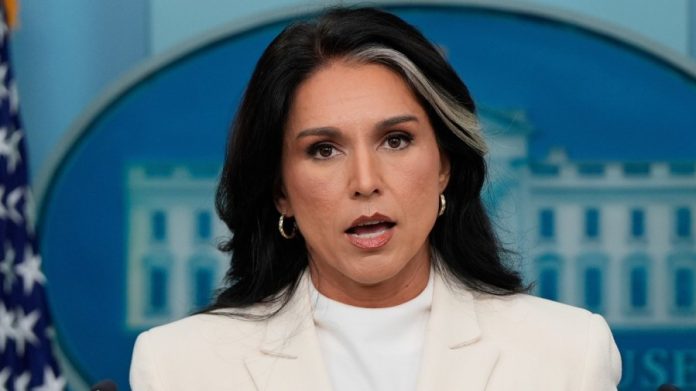
Director of National Intelligence Tulsi Gabbard plans to slash 40 percent of the agency’s staff by October in a move she said would help transform the head of the intelligence community into “ODNI 2.0.”
Gabbard’s cuts would reassign roles or eliminate various centers within the Office of the Director of National Intelligence (ODNI), including those that monitor foreign efforts to influence Americans; the proliferation of weapons of mass destruction, including biological weapons; and a team monitoring for cyberattacks.
A fact sheet from ODNI boasts the department has already slashed 500 jobs and that the future cuts would save an estimated $700 million at the agency, which helps coordinate among 18 different agencies that make up the sprawling U.S. intelligence community.
Targeted in the restructuring is the Foreign Malign Influence Center (FMIC), which has dedicated itself to tracking the efforts of U.S. adversaries to influence the U.S. public through social media and disinformation campaigns designed to sow division and shift votes.
The Trump administration argues the center has been used “to justify the suppression of free speech” and cited its work in responding to the Hunter Biden laptop.
ODNI also accused the Foreign Malign Influence Center of “falsely alleging Putin ‘aspired’ to help President Trump win the 2016 election,” though that conclusion is shared by most reports that have evaluated Russia’s efforts in the 2016 contest, including in a bipartisan report from the Senate Intelligence Committee.
Gabbard argued that other elements of the intelligence community already monitor foreign influence campaigns, “making FMIC redundant” — the same argument used for the National Counterproliferation and Biosecurity Center.
The fact sheet argues it biosecurity mission is no longer needed after the COVID-related national emergency.
“It has become apparent that taking action to address global health issues falls well outside of ODNI’s core mission,” ODNI states.
Gabbard said the need for the shift was part of “ending the weaponization of intelligence and holding bad actors accountable.”
“Over the last 20 years, ODNI has become bloated and inefficient, and the intelligence community is rife with abuse of power, unauthorized leaks of classified intelligence, and politicized weaponization of intelligence,” Gabbard said in a statement.
“ODNI and the IC must make serious changes to fulfill its responsibility to the American people.”
The shift comes a day after Gabbard revoked the security clearances of 37 current and former intelligence officials, many with ties to prior Democratic administrations.
Even as a top Democrat agreed ODNI could use a revamp, he argued Gabbard was not the person to deliver it.
“Twenty years after it was established, there is broad, bipartisan agreement that the Office of the Director of National Intelligence is in need of thoughtful reform. The Intelligence Authorization Act directs Director Gabbard to submit a plan to Congress outlining her proposed changes, and we will carefully review her proposals and conduct rigorous oversight to ensure any reforms strengthen, not weaken, our national security,” Sen. Mark Warner (D-Va.), the top Democrat on the Senate Intelligence Committee, said in a statement.
“But given Director Gabbard’s track record of politicizing intelligence — including her decision just yesterday to revoke security clearances from career national security officials — I have no confidence that she is the right person to carry out this weighty responsibility.”
Mark Zaid, a longtime national security lawyer, said the redesign was a clear effort to cut staff members who might push back against the Trump administration
“This isn’t about reform. It isn’t about strengthening our intelligence agencies. It is about the Installation of loyalists & getting rid of anyone who opposes the patrimonialistic/authoritarian policies of Trump, regardless of whether DEM or GOP,” he wrote on the social platform X.
But the plan won praise from Republican members of Congress.
“Anyone involved in the IC and intelligence oversight has known for over a decade that the ODNI has been in desperate need of reform to return the agency to its critical national security mission. This is an excellent first step in the right direction,” House Intelligence Chair Rick Crawford (R-Ark.) said in a statement.
“Correcting the direction of a large institution, grounded in its ways, will never be easy and will take time. It’s bound to be laden with obstructions and those looking to undermine change. But change is in order. President Trump and Director Gabbard are leading the charge by not just calling out the problems but taking action to address them.”
Gabbard also proposes eliminating a number of other offices she accused, without evidence, of leaking intelligence of political biases.
Among those slashed is the External Research Council, which Gabbard said amounted to “politically appointed partisans who brought their external biases,” as well as the Strategic Futures Group, responsible for long-term forecasting on threats, which Gabbard accused of being used “to push a partisan political agenda.”
It’s not entirely clear how many staff work at ODNI, but that figure has been a target of Senate Intelligence Chair Tom Cotton (R-Ark.), who earlier this year said the office had nearly 2,000 staff.
“The ODNI staff is measured in the thousands, when it should be measured in the dozens, maybe a few hundred,” Cotton said at a hearing at the beginning of the year.
“I promise, that’s going to change.”
Cotton on Wednesday praised the move, even as he referenced the need for congressional review.
“Congress created the ODNI to be a lean organization that used small staffs to coordinate across the Intelligence Community and execute specific, important tasks. Today’s announcement is an important step towards returning ODNI to that original size, scope, and mission. And it will help make it a stronger and more effective national security tool for President Trump,” he said in a statement.
“I look forward … to working with Director Gabbard to implement these reforms and provide the ODNI with the legislative relief necessary to ensure our Intelligence Community can focus on its core mission: stealing secrets from our adversaries.”
Updated at 6:42 pm. EDT

